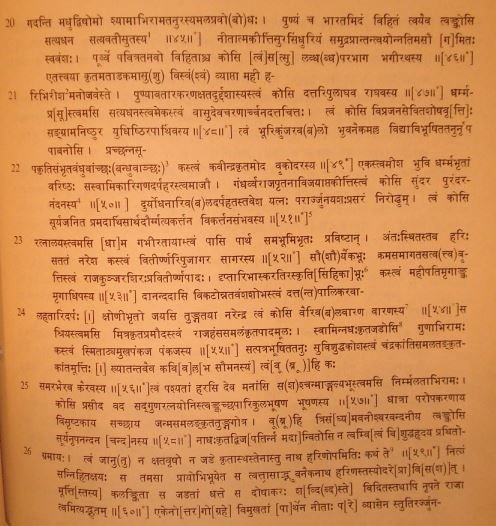|
INSCRIPTIONS OF THE CHANDELLAS OF JEJAKABHUKTI
GWĀLIOR STONE INSCRIPTION OF MAHĪPĀLA

_____________________
1 Vyāsa, whose complexion was dark.
2 The word atāḍaka here means (1) not a striker and (2) relieved of Tāḍakā; and Hari has the double
meaning of (1) a horse and (2) a monkey.
3 That following his brother’s intention Bhīma disguised himself as a cook at the time of ajñāta-vāsa is
well known.
4 The reference is to Arjuna who vanquished the army of Chitraratha.
5 Here is an allusion to Karṇa (born of the Sun) who removed the pride of the enemies of Duryōdhana
(strong in contest), who made an attempt to check the fame of the enemy Arjuna (check the white fame
of the enemies) and who removed the misfortune of the supplicants.
6 Siṁhikā-bhū is Rāhu (Saiṁhikēya) who causes an eclipse by devouring the Sun. The king is here
described as overpowering the Sun in the form of his haughty adversaries and killing their elephants.
For aṅk-āgata-satva-vṛittiḥ, cf. Raghuvaṁśa, II, 38.
7 Heresr124.JPG is a play on the following words: dāna means (1) a gift and (2) ichor; karavāla means (1) a sword
and (2) turn of the trunk of an elephant, Dantapāli is a kind of weapon.
8 Mitra means (1) the sun and (2) a friend; and jaḍa means dull (the same as jala, meaning ‘water’).
9 This verse mentions the actions of Vishṇu, Paraśurāma, Vāmana, Kṛishṇa and Nārāyaṇa, respectively.
The word jaḍa is used here in its double meaning : (water) and (stupid), as above.
sr124.JPG
|